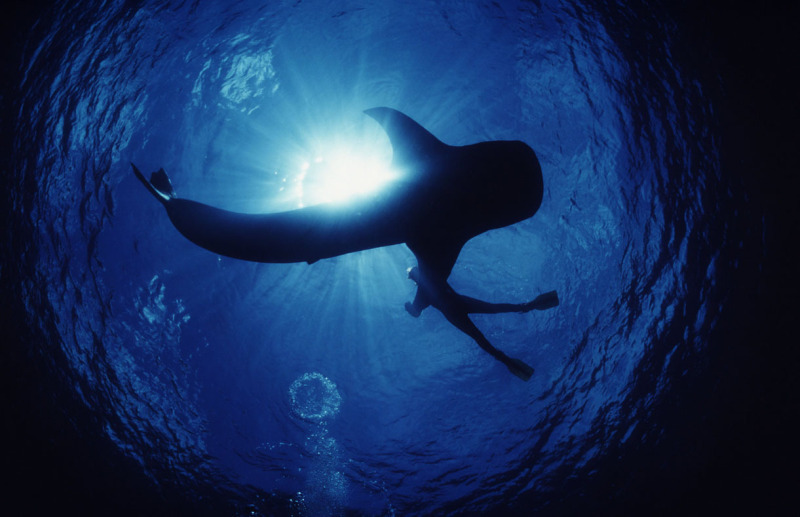.

Whale shark (Rhincodon typus) seen from underwater with snorkler in Indo-Pacific Ocean.
© Jürgen Freund / WWF
Since the 1990s, WWF-Vietnam has been working intensively to save Viet Nam’s ecosystems and biodiversity. This work covers a wide range of areas, from forests, marine species and ecosystem conservation to promoting sustainable production and consumption, eliminating carbon footprints, climate change adaptation and mitigation, and efficient energy use.
To mitigate the negative impacts of tourism on Vietnam’s biodiversity, WWF-Vietnam would like to provide the following recommendations to responsible tourists, in order to further support our conservation efforts.
I. Plastic waste reduction
DO
Be considerate when using plastic items;
Bring your own mug/reusable cup for take-away coffee to prevent using disposable cups;
Bring your own toothbrush and shower cap when staying in hotels. If you need to use the hotel’s products, try to use them more than once;
Practice the 5Rs: Refuse, Reduce, Reuse, Recycle, Redesign.
DON'T
Dump waste (including plastic waste) into the sea or in the forest. Bring rubbish back with you and dispose of it properly; put it into the trash bin and recycle;
Use single use plastic items, such as straws, plastic bags, disposable rain coats, bath soap/shampoo in sachets, plastic cutlery, etc.
II. Marine protection and responsible seafood consumption
DO
Consume MSC, ASC certified, local seafood products.
DON'T
Stand on coral reefs when you go diving or snorkeling;
Pick up anything from the marine protected areas;
Consume products from endangered wildlife such as Dugong, sea turtles (including meat, eggs, bekko (products from turtle shell), shark fin, blue swimming crab under 10cm.
III. Wildlife protection
DON'T
Disturb, approach, or touch any wildlife;
Buy or consume parts or derivatives of rhino, elephant, tiger, pangolin, bear, saola, douc and wildlife bushmeat.
IV. Reduction of carbon footprint and energy efficiency
DO
Use the air conditioner when necessary, and set it at 26oC;
Unplug all electrical equipment and turn off standby power when not in use;
Re-use towels and bed sheets instead of having them washed every day;
Use public transport, walk, or ride a bike where possible; share transportation when possible if you take a car or taxi.
V. Travel to wetland protected areas in the Mekong Delta
DO
Be accompanied by a guide authorised by the National Park/Wetland Reserve and follow his/her instructions;
Leave the park/natural reserve before sunset;
Keep the environment clear and clean.
DON'T
Carry ammunition, chemicals, sound instruments, etc. in the National Park/Wetland Reserve;
Smoke or kindle fire inside the National Park/Wetland Reserve;
Drop any rubbish or plastic waste inside the National Park/Wetland Reserve;
Cook inside the National Park/Wetland Reserve;
Use flash when photographing animals;
Disturb the birds, animals, or touch any wildlife.
VI. Travel in the forest
DO
Take only pictures (or memories) and leave only footprints;
Use public transport when possible or take a walking tour;
Be accompanied by a guide authorised by the National Park/Nature Reserve and follow his/her instructions;
Keep calm and silent when walking in the forest;
Show respect for the local culture and people;
Buy souvenirs made from FSC certified wood;
Bring waste (if any) with you out of the forest and put it into the trash or recycling bin;
Use rechargeable batteries rather than single use ones;
Bring cooked food as much as you can (avoid cooking in the forest);
Use available, legal camping grounds instead of building a new camp or clearing a new place to hang a hammock;
Bring reusable walking sticks instead of making a new one from the forest;
Use reusable containers for food and drinking water;
Pick up any waste (especially plastic) that you see in the forest (not only yours) and bring it out of the forest for proper disposal.
DON'T
Destroy anything in the forest;
Carry ammunition, chemicals, sound instruments, etc. in the National Park/Nature Reserve;
Buy and consume any wildlife or unknown products;
Smoke, kindle fire or cook inside the forest;
Drop any rubbish or plastic waste inside the forest;
Use flash when photographing animals;
Disturb the birds or other animals;
Carve on tree-trunks or caves;
Disturb, approach, or touch any wildlife;
Clear a new trail if it is not necessary;
Use streams as a toilet;
Make any unnecessary noise.
VII. No food waste
DO
Select/choose the right food products that will be good for your health and good for the environment;
Only order as much food as you will eat/do not waste food;
Prioritise choosing food that is:
* ASC certified products such as the ASC giant tiger prawn, ASC Whiteleg shrimp, ASC Pangasius, and ASC Tilapia;
* Organic aquaculture and agriculture products;
* Other certified products such as Viet G.A.P, Global G.A.P., BAP;
* Local products;
* Low trophic level: derived from vegetables/plants, herbivore, omnivore, carnivore species.